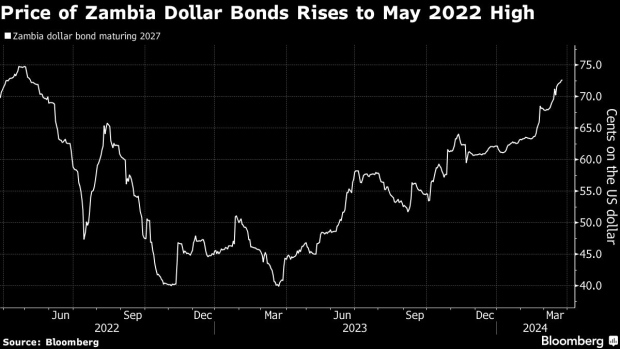Zambia bonds gain as Moody’s sees debt talks unlocking growth
Zambia’s dollar bonds strengthened as the country worked to finalize a long-delayed debt restructuring, with Moody’s Investors Service saying a deal would be a catalyst for broader economic reforms.
The price of Zambia’s debt due 2027 gained for a sixth day to the highest since May 2022, rising 0.1 cents on the dollar to 72.637 cents at 12:09 p.m. in London on Monday. Parties to negotiations that started last week expect to conclude a deal for $3 billion of global bonds within days, people familiar with the matter said at the time.
A potential agreement will likely mirror previous terms on coupon adjustments, lower principal amounts and maturity extensions, Moody’s said in a note on Monday.
“Debt and liquidity relief would allow the government the time and space to implement wider economic and fiscal reforms, while reducing investor uncertainty and supporting ongoing funding disbursements under Zambia’s International Monetary Fund program,” Moody’s said.
The government of President Hakainde Hichilema is looking to draw a line under three years of debt negotiations after it became the first African nation to default during the pandemic era. The central bank previously warned that the prolonged restructuring process was limiting capital inflows, pressuring the foreign exchange market.
The country struck an agreement last year with a group government lenders, including China and France, to rework $6.3 billion in loans.
Drought Impact
Still, Moody’s warned that the latest round of bondholder negotiations is taking place in the midst of a severe drought, with far-reaching implications for the economy, energy supply and food security.
“We expect the effects of the drought to weigh on Zambia’s debt carrying capacity, increasing the risk of higher losses for creditors from the current negotiations and following the debt restructuring,” Moody’s said.
Zambian sovereign bonds have delivered 16.4% returns to investors this year, compared with an average return of 1.6% for emerging-market government debt, according to data compiled by Bloomberg. The kwacha has weakened 3.2% against the dollar this year, compared to a 0.8% decline for the MSCI index of emerging-market currencies.








